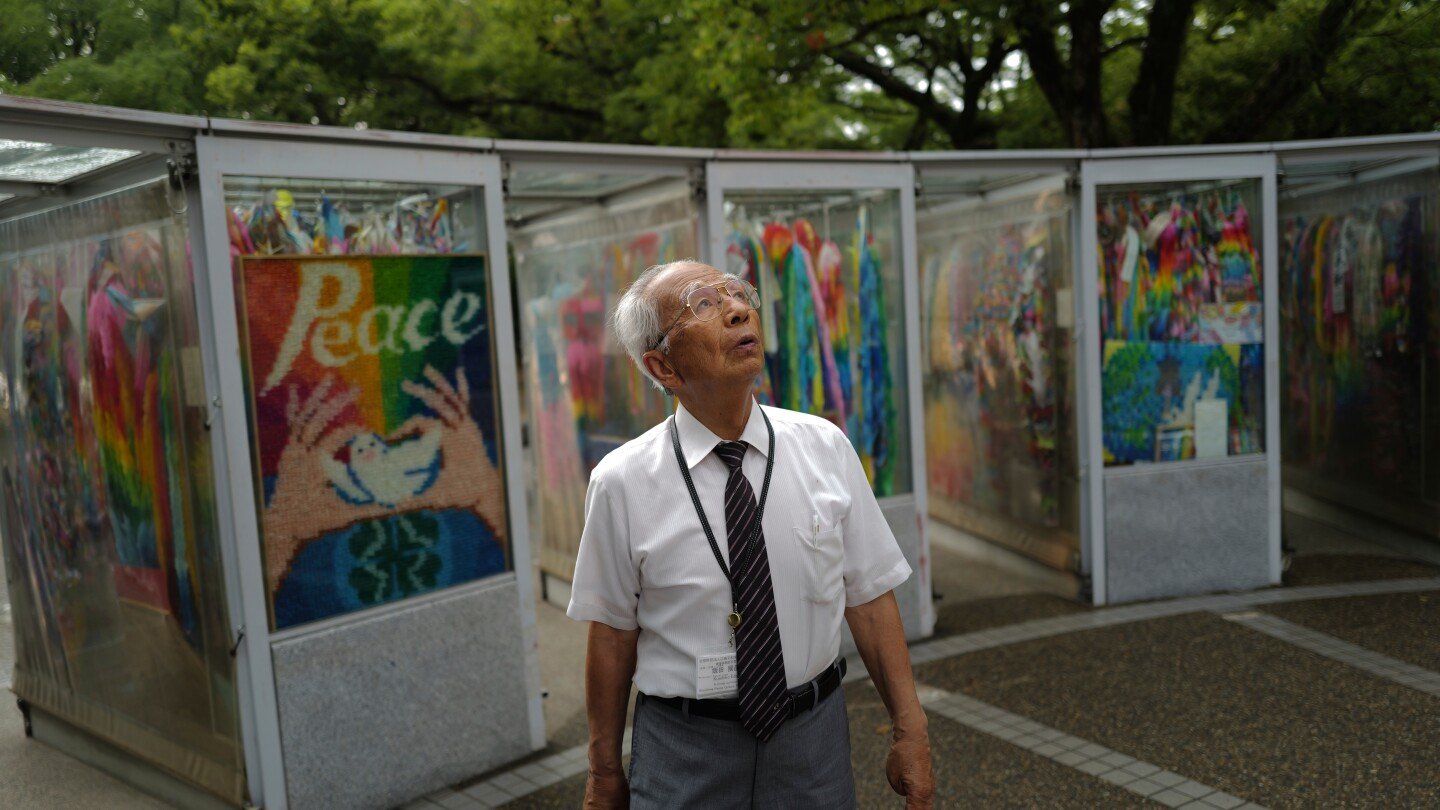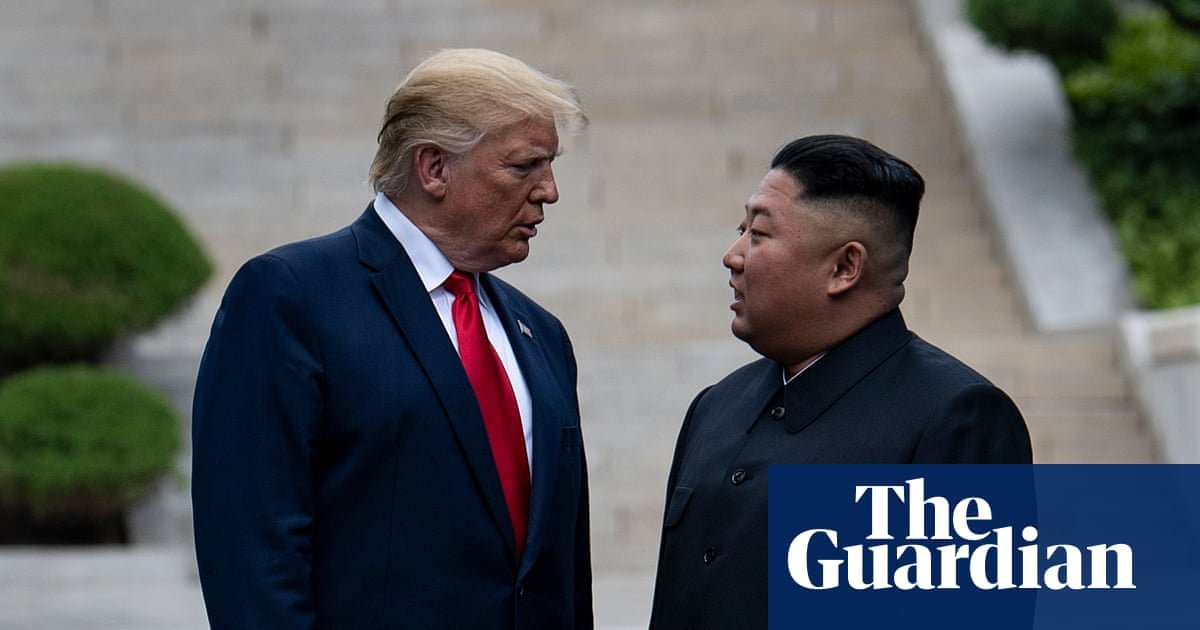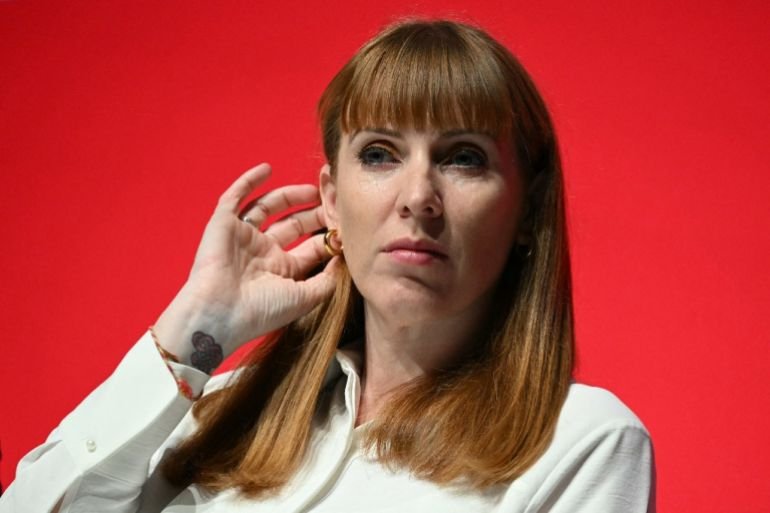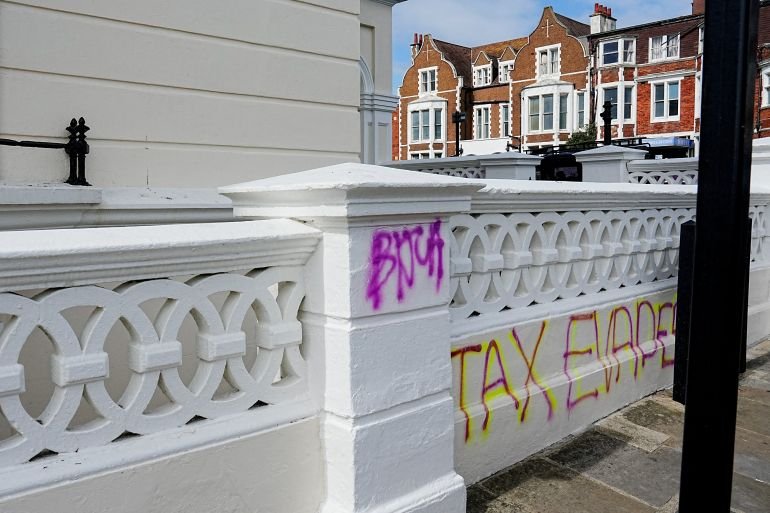Top Stories
Japan’s aging atomic bomb survivors speak out against nuclear weapons

HIROSHIMA, Japan (AP) — Eighty years after the atomic bombings of Hiroshima and Nagasaki, many of the remaining Japanese survivors are increasingly frustrated by growing nuclear threats and the acceptance of nuclear weapons by global leaders.
The U.S. attacks on Hiroshima on Aug. 6, 1945, and three days later on Nagasaki killed more than 200,000 people by the end of that year. Others survived but with radiation illness.
About 100,000 survivors are still alive. Many hid their experiences to protect themselves and their families from discrimination that still exists. Others couldn’t talk about what happened because of the trauma they suffered.
Some of the aging survivors have begun to speak out late in their lives, hoping to encourage others to push for the end of nuclear weapons.
An English-speaking guide at Hiroshima’s peace park
Despite numerous health issues, survivor Kunihiko Iida, 83, has devoted his retirement years to telling his story as a way to advocate for nuclear disarmament.
He volunteers as a guide at Hiroshima’s Peace Memorial Park. He wants to raise awareness among foreigners because he feels their understanding of the bombings is lacking.
It took him 60 years to be able to talk about his ordeal in public.
When the U.S. dropped a uranium bomb on Hiroshima, Iida was 900 meters (yards) away from the hypocenter, at a house where his mother grew up.
He was 3 years old. He remembers the intensity of the blast. It was as if he was thrown out of a building. He found himself alone underneath the debris, bleeding from shards of broken glass all over his body.
“Mommy, help!” he tried to scream, but his voice didn’t come out. Eventually he was rescued by his grandfather.
Within a month, his 25-year-old mother and 4-year-old sister died after developing nosebleeds, skin problems and fatigue. Iida had similar radiation effects through elementary school, though he gradually regained his health.
He was almost 60 when he finally visited the peace park at the hypocenter, the first time since the bombing, asked by his aging aunt to keep her company.
After he decided to start telling his story, it wasn’t easy. Overwhelmed by emotion, it took him a few years before he could speak in public.
In June, he met with students in Paris, London and Warsaw on a government-commissioned peace program. Despite his worries about how his calls for nuclear abolishment would be perceived in nuclear-armed states like Britain and France, he received applause and handshakes.
Iida says he tries to get students to imagine the aftermath of a nuclear attack, how it would destroy both sides and leave behind highly radioactive contamination.
“The only path to peace is nuclear weapons’ abolishment. There is no other way,” Iida said.
A regular at anti-war
protests
Fumiko Doi, 86, would not have survived the atomic bombing on Nagasaki if a train she was on had been on time. The train was scheduled to arrive at Urakami station around 11 a.m., just when the bomb was dropped above a nearby cathedral.
With the delay, the train was 5 kilometers (3 miles) away. Through the windows, Doi, then 6, saw the flash. She covered her eyes and bent over as shards of broken windows rained down. Nearby passengers covered her for protection.
People on the street had their hair burnt. Their faces were charcoal black and their clothes were in pieces, she said.
Doi told her children of the experience in writing, but long hid her status as a survivor because of fear of discrimination.
Doi married another survivor. She worried their four children would suffer from radiation effects. Her mother and two of her three brothers died of cancer, and two sisters have struggled with their health.
Her father, a local official, was mobilized to collect bodies and soon developed radiation symptoms. He later became a teacher and described what he’d seen, his sorrow and pain in poetry, a teary Doi explained.
Doi began speaking out after seeing the 2011 Fukushima Daiichi nuclear disaster following a strong earthquake and tsunami, which caused radioactive contamination.
She travels from her home in Fukuoka to join anti-war rallies, and speaks out against atomic weapons.
“Some people have forgotten about the atomic bombings … That’s sad,” she said, noting that some countries still possess and develop nuclear weapons more powerful than those used 80 years ago.
“If one hits Japan, we will be destroyed. If more are used around the world, that’s the end of the Earth,” she said. ”That’s why I grab every chance to speak out.”
At Hiroshima, learning from survivors
After the 2023 Hiroshima G7 meeting of global leaders and the Nobel Peace Prize awarded to the grassroots survivors’ group Nihon Hidankyo last year, visitors to Hiroshima and Nagasaki peace museums have soared, with about one third of them coming from abroad.
On a recent day, most of the visitors at the Hiroshima peace park were non-Japanese. Samantha Anne, an American, said she wanted her children to understand the bombing.
“It’s a reminder of how much devastation one decision can make,” Anne said.
Katsumi Takahashi, a 74-year-old volunteer specializing in guided walks of the area, welcomes foreign visitors but worries about Japanese youth ignoring their own history.
On his way home, Iida, the survivor and guide, stopped by a monument dedicated to the children killed. Millions of colorful paper cranes, known as the symbol of peace, hung nearby, sent from around the world.
Even a brief encounter with a survivor made the tragedy more real, Melanie Gringoire, a French visitor, said after Iida’s visit. “It’s like sharing a little piece of history.”
___
Associated Press video journalists Mayuko Ono and Ayaka McGill contributed to this report.
Top Stories
US Navy Seals killed North Korean civilians in botched 2019 mission, report says | North Korea

US Navy Seals shot and killed a number of North Korean civilians during a botched covert mission to plant a listening device in the nuclear-armed country during high-stakes diplomatic negotiations in 2019, the New York Times reported on Friday.
Citing unidentified sources, including current and former military officials with knowledge of the still-classified details, the newspaper said Donald Trump approved the operation during his first administration, as he was involved in historic talks with the North Korean leader, Kim Jong-un.
The plan was designed to fix a “blind spot” in US intelligence that would allow the US to intercept the North Korean leader’s communications, potentially giving Trump an advantage ahead of the summit between the two leaders in 2019.
But it unraveled when the detachment of Navy Seals came across North Korean civilians who appeared to be diving for shellfish, the Times reported. The American forces opened fire, killing all those on the small fishing vessel, the report said, without specifying the number of casualties.
Neither the US nor the North Korean government has made the botched operation public. Before approving the plan, the White House had been concerned that even a small military action against North Korea could provoke a “catastrophic retaliation”.
A classified Pentagon review later concluded the killings were justified under the rules of engagement, the report said.
In 2019, the Seals were dispatched to North Korean waters in a nuclear-powered submarine, and then deployed in two mini-subs in frigid waters to reach the shore. A group of eight Seals were then supposed to sneak past North Korean border forces, install the device, and then escape undetected. However, the operation was disrupted by the attack on the civilians, and the Seals left without installing the device.
The newspaper also revealed that the plan was based on a similar 2005 operation approved by George W Bush.
The White House, the Pentagon and the US embassy in Seoul did not immediately respond to requests for comment on the report.
Since Trump’s last summit with Kim in 2019, talks have fallen apart and North Korea has forged ahead with its nuclear weapons and ballistic missile program.
Trump this week said that US forces had killed 11 people in a strike on a boat in international waters that he claimed was carrying drugs to the United States. The White House has released few details about the operation, which it claimed targeted members of Venezuela’s Tren de Aragua gang.
Top Stories
David Lammy named UK deputy prime minister amid Labour Party turmoil | Government News

Lammy appointment follows resignation of left-wing champion Angela Rayner, who stepped down over a tax scandal.
Published On 5 Sep 2025
United Kingdom foreign minister David Lammy has been appointed as the country’s new deputy prime minister, replacing Angela Rayner after she resigned amid a tax scandal.
Rayner’s resignation on Friday for breaching ministerial code after underpaying tax on her flat prompted a major cabinet reshuffle, with Lammy’s elevation to deputy prime minister among a raft of new appointments.
Recommended Stories
list of 3 itemsend of list
The departure of Rayner – a figure viewed by many as a ballast of the left and a potential successor to Prime Minister Keir Starmer – has created turmoil in the Labour Party, which now trails hard-right firebrand Nigel Farage’s Reform UK party in national polls.
In a letter to Starmer on Friday, Rayner conceded she “did not meet the highest standards” and would resign from her roles as housing minister and deputy leader of Labour.
“I deeply regret my decision to not seek additional specialist tax advice,” she said, having last week admitted to underpaying a surcharge on the flat. She said she took “full responsibility for this error”.
Starmer, whose government has endured a series of crises since taking power in July 2024, replied that he was “very sad” to lose her from government, but added: “You will remain a major figure in our party.”
“In losing her, Keir Starmer loses perhaps the closest link the Labour Party has to its working-class roots,” reported Al Jazeera’s Jonah Hull from Birmingham in the UK.
Starmer’s reshuffle also saw Yvette Cooper moved from the interior ministry to replace Lammy as foreign secretary, the prime minister’s office said. Shabana Mahmood, who was justice secretary, replaces Cooper as home secretary; while Lammy now takes on the role of justice secretary in addition to his position as deputy prime minister.
House of Commons leader Lucy Powell and Scotland secretary Ian Murray confirmed in statements on Friday that they were leaving government, following earlier reports they had been fired.
In a post on X, Powell said Starmer had told her he intended to replace her with a new Commons leader.
“This has not been an easy time for the government. People want to see change and improvements to their difficult lives,” Powell said.
A Statement from me: pic.twitter.com/5NmhJeKDRV
— Lucy Powell MP (@LucyMPowell) September 5, 2025
‘Complexity’ in Rayner tax scandal
Rayner disclosed on Wednesday that she had underpaid so-called stamp duty on a seaside flat in southern England following days of reports suggesting that she had saved 40,000 pounds ($53,000) by removing her name from the deeds of another property.
After looking into the case, ethics chief Laurie Magnus said the rules “entailed a considerable degree of complexity” and recognised that Rayner had twice been advised that the lower rate of stamp duty was applicable.
That advice, however, was qualified by the admission that it did not constitute expert tax advice.
Rayner’s failure to seek further guidance meant she “cannot be considered to have met the highest possible standards of proper conduct”, said Magnus.
Rayner, who became a single mother at the age of 16 after growing up in poverty, worked her way up from the shop floor as a union representative, forging a lifelong involvement with the Labour Party.
Often tipped to become Labour leader one day, she has been a top target for political attacks by the Conservatives and right-wing media.

Top Stories
EU slaps Google with €2.95B fine despite Trump trade threat – POLITICO

The Commission’s multibilllion-euro fine falls short of the €4.34 billion fine the EU executive slapped on Google in 2018 over abuse of dominance related to Android mobile devices, but is higher than the €2.42 billion fine the firm faced for favoring its own comparison-shopping service in 2017.
The Commission’s decision comes as a parallel case before the U.S. courts will soon come to trial.
In April, a U.S. federal judge found that Google had illegally maintained a monopoly in display search advertising, and a trial is scheduled to begin Sept. 22.
The U.S. government is seeking a divestment of Google’s assets in that trial.
In a statement, Google’s Global Head of Regulatory Affairs Lee-Anne Mulholland said that the firm will appeal the Commission’s decision.
“It imposes an unjustified fine and requires changes that will hurt thousands of European businesses by making it harder for them to make money,” said Mulholland.
This story has been updated.
-

 Business1 week ago
Business1 week agoThe Guardian view on Trump and the Fed: independence is no substitute for accountability | Editorial
-
Tools & Platforms3 weeks ago
Building Trust in Military AI Starts with Opening the Black Box – War on the Rocks
-

 Ethics & Policy1 month ago
Ethics & Policy1 month agoSDAIA Supports Saudi Arabia’s Leadership in Shaping Global AI Ethics, Policy, and Research – وكالة الأنباء السعودية
-

 Events & Conferences4 months ago
Events & Conferences4 months agoJourney to 1000 models: Scaling Instagram’s recommendation system
-

 Jobs & Careers2 months ago
Jobs & Careers2 months agoMumbai-based Perplexity Alternative Has 60k+ Users Without Funding
-

 Education2 months ago
Education2 months agoVEX Robotics launches AI-powered classroom robotics system
-

 Funding & Business2 months ago
Funding & Business2 months agoKayak and Expedia race to build AI travel agents that turn social posts into itineraries
-

 Podcasts & Talks2 months ago
Podcasts & Talks2 months agoHappy 4th of July! 🎆 Made with Veo 3 in Gemini
-

 Podcasts & Talks2 months ago
Podcasts & Talks2 months agoOpenAI 🤝 @teamganassi
-

 Education2 months ago
Education2 months agoMacron says UK and France have duty to tackle illegal migration ‘with humanity, solidarity and firmness’ – UK politics live | Politics





















